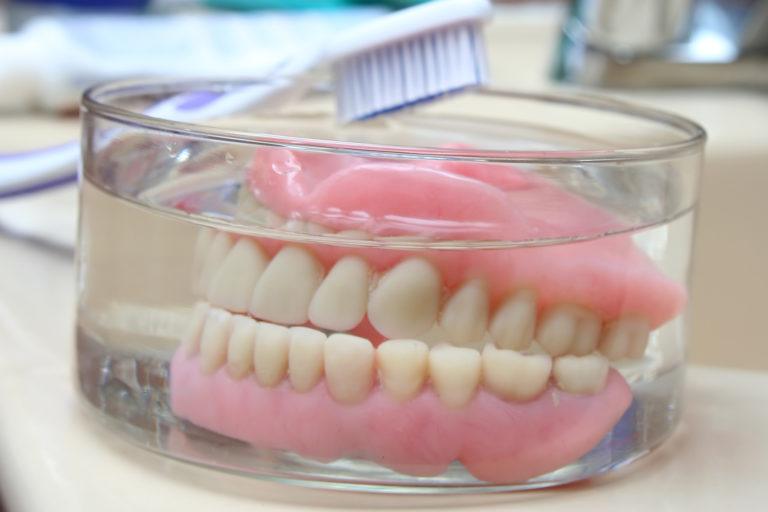
Quick Tips
Dentures work hard, and like natural teeth, they collect food particles, plaque, and bacteria that can lead to staining, odors, and even infections. Whether you have full or partial dentures, keeping them clean is essential for oral health, comfort, and longevity. A proper cleaning routine ensures your dentures stay fresh, stain-free, and looking as good as new.
Why Cleaning Dentures Matters
Failing to clean dentures properly can lead to bacterial buildup, bad breath, and even fungal infections like denture stomatitis. Unlike natural teeth, dentures don’t have enamel, meaning they can be more prone to staining from coffee, tea, and certain foods. Regular cleaning keeps them looking great and helps prevent damage that could lead to costly replacements.
What You’ll Need to Clean Dentures
Before getting started, gather these supplies:
- Denture brush or soft-bristled toothbrush – Designed for gentle but effective cleaning.
- Mild dish soap or denture cleaner – Removes debris without damaging the material.
- Baking soda or white vinegar – Helps eliminate stains and odors naturally.
- Denture soaking solution – Disinfects and prevents bacteria buildup.
- Warm water – For rinsing and soaking (avoid hot water, which can warp dentures).
- Soft towel – Provides a safe surface to prevent breakage.
- Denture case – For safe storage when not in use.
How to Clean Dentures in 7 Steps
1. Rinse Dentures After Every Meal
After eating, remove your dentures and rinse them under lukewarm running water to wash away food particles and prevent buildup. This quick rinse keeps debris from hardening and makes deep cleaning easier later.
2. Brush Gently with a Denture Brush
Use a soft-bristled denture brush or toothbrush to clean all surfaces of your dentures. Avoid using regular toothpaste, as it can be too abrasive and cause micro-scratches where bacteria can thrive. Instead, use mild dish soap or a denture cleanser.
3. Soak in a Denture Cleaning Solution
Place dentures in a denture cleaning solution or a mix of equal parts white vinegar and water. Let them soak for 15–30 minutes (or overnight, if recommended by your dentist) to remove plaque and stains. Soaking helps kill bacteria and keeps dentures fresh.
4. Use Baking Soda for Extra Whitening
For tougher stains, make a paste of baking soda and water and gently rub it onto the dentures with a soft brush. This method helps lift discoloration without damaging the material.
5. Rinse Thoroughly Before Wearing
Before putting dentures back in, rinse them thoroughly under lukewarm water to remove any leftover cleaner or baking soda residue. Failing to rinse properly can cause irritation or an unpleasant taste.
6. Clean Your Mouth and Gums Daily
Even if you wear full dentures, oral hygiene is still important. Brush your gums, tongue, and roof of your mouth with a soft toothbrush or damp cloth to remove bacteria and stimulate circulation. If you have partial dentures, brush your remaining natural teeth as well.
7. Store Dentures Properly When Not in Use
When not wearing dentures, store them in clean water or a denture-soaking solution to prevent them from drying out or losing their shape. Never use hot water, as it can warp the material. Keep them in a denture case if traveling.
How Professionals Clean Dentures
If stains and buildup persist, dentists and professionals use specialized techniques to deep-clean dentures, including:
- Ultrasonic cleaning – Uses high-frequency sound waves to remove plaque and tartar.
- Professional denture polishing – Restores shine and removes deep stains.
- Antibacterial treatments – Eliminates fungal or bacterial infections.
If dentures become loose or uncomfortable, it’s best to visit a dentist for adjustments rather than attempting DIY fixes (denture care guide).
How Often Should You Clean Dentures?
- After every meal: Rinse to remove food debris.
- Daily: Brush and soak to keep dentures fresh.
- Weekly: Use baking soda or vinegar to lift stains.
- Annually: Have a professional deep clean to maintain long-term health.
Final Thoughts
Clean dentures mean better oral health, fresher breath, and a more confident smile. By following a simple routine and using the right cleaning techniques, you’ll keep your dentures looking great and feeling comfortable for years to come.
For more oral care tips, check out How to Clean a Retainer. Keep your dental appliances in top shape!